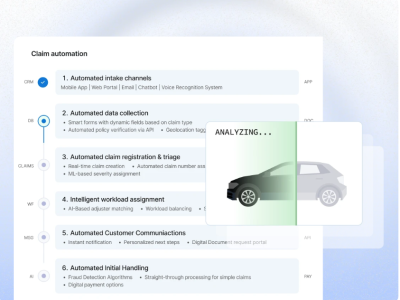A skilled workforce is the backbone of any thriving business today.
They drive innovation, deliver top-quality work, and adapt to changing landscapes, giving you a vital edge in the competitive market.
Investing in your people isn’t just the right thing to do, it’s a strategic advantage that unlocks long-term success.
Companies are losing a significant portion of their workforce due to a lack of investment in skills development.
A staggering 66% of employees planning to quit within a year cite this as a key reason, highlighting the high cost of employee turnover (Amazon & Workplace Intelligence, 2024).
This is particularly true for younger generations, with 74% of Gen Z and Millennials willing to leave for better development opportunities (Amazon & Workplace Intelligence, 2024).
To combat this trend, companies are increasingly adopting the concept of a Learning Enterprise.
This refers to an organization that fosters a culture of continuous learning and development for all its employees.
In a Learning Enterprise, employees are encouraged and supported in acquiring new skills and knowledge throughout their careers.
This can be achieved through various means, such as providing access to online courses, mentorship programs, or on-the-job training.
By prioritizing continuous learning, companies can not only retain their talent but also build a more adaptable and innovative workforce.
This is crucial in today’s rapidly changing business environment, where new technologies and market trends emerge constantly.
Table of contents
- What is an Enterprise Learning Management System
- Why Do Businesses Need an LMS?
- How Can an LMS Transform the Enterprise?
- Benefits of Enterprise Learning Management System
- How to Choose the Best Enterprise Learning Management System for Your Enterprise?
- Conclusion
- Need an Enterprise Learning Management System in the Gulf Region?

What is an Enterprise Learning Management System
An Enterprise Learning Management System is essentially a powerful software program that companies use to manage employee training.
Think of it like a digital training center where you can easily deliver course materials, track employee progress, and keep all your learning and development programs organized.
Features of Enterprise Learning Management System
Here’s a closer look at its key functionalities:
Delivering Training:
- Content Variety: Enterprise LMS allows you to upload a wide range of training materials, catering to different learning styles.
This can include traditional formats like PDFs and presentations, engaging video content, or even interactive elements. You can even conduct live online training sessions directly through the platform for a more personalized experience.
- Standardized Content: To ensure seamless transfer of courses between platforms and avoid compatibility issues, most Enterprise LMS support industry standards like SCORM and xAPI.
This means you can develop a course at once and use it across different systems.
- Targeted Learning: Organizations with diverse departments or teams can benefit from the ability to create separate learning portals within the Enterprise Learning Management System. This allows for focused training specific to each department’s needs and roles.
For example, the marketing team might have a portal with courses on social media marketing tools, while the sales team focuses on customer relationship management (CRM) software training.
Tracking Progress:
- Monitoring Performance: An Enterprise Learning Management System provides valuable insights into employee progress through training programs.
You can track individual completion rates for courses, assess performance on quizzes or exams, and gain a clear picture of how employees are absorbing the material.
- Staying on Schedule: To keep employees on track and ensure timely completion of training, Enterprise Learning Management System allows you to set up automated reminders.
These can be notifications about upcoming deadlines for assigned courses, nudges to complete partially finished modules, or prompts to take required assessments.
Reporting and Analysis:
- Measuring Effectiveness: One of the biggest advantages of using an Enterprise Learning Management System is its reporting capabilities.
The system can generate comprehensive reports on learner progress, exam results, and survey responses from employees who have completed training.
- Data-Driven Improvement: By analyzing the data gathered through reports, companies can identify areas where their training programs are excelling and areas that might need improvement.
This data can be used to refine existing content, develop new courses to address knowledge gaps, and ensure your training programs are truly effective in achieving your learning objectives.
Why Do Businesses Need an LMS?
Businesses need an Enterprise Learning Management System to overcome the limitations of traditional training methods and create a more efficient, engaging, and measurable training environment for their employees.
Traditional methods like classroom lectures often face challenges that hinder employee engagement and ultimately, the effectiveness of the training itself. These challenges include:
1. Lack of scalability:
Classroom training is difficult to scale for a growing workforce or fluctuating training needs. Scheduling sessions, managing logistics, and ensuring everyone gets the training they need becomes cumbersome.
2. High costs:
Traditional training involves expenses for physical training spaces, instructor travel, printed materials, and potentially even lost productivity while employees attend sessions. These costs can add up quickly.
3. Limited accessibility:
Classroom training typically happens at a specific time and location, which can be inconvenient for employees with busy schedules or those working remotely.
An Enterprise Learning Management System offers a powerful solution to these challenges by providing several key benefits:
- Scalability and Flexibility: An Enterprise LMS can easily accommodate a growing workforce or fluctuating training needs.
New courses can be uploaded quickly, and existing content can be readily updated. This eliminates the logistical hurdles of scheduling classroom sessions and allows employees to access training materials at their convenience.
- Cost-Effectiveness: Enterprise Learning Management System can significantly reduce training costs.
Eliminating the need for physical training spaces, travel expenses, and printed materials translates to substantial savings. Additionally, the reusability of online content minimizes the need for constant course redevelopment.
- Accessibility and Engagement: Enterprise Learning Management System provides employees with 24/7 access to training materials from any device with an internet connection.
This caters to different learning styles and busy work schedules, maximizing employee engagement. Enterprise Learning Management System can also offer interactive features like multimedia content, gamification elements, and discussions to make learning more enjoyable and effective.
- Measurable Results: Unlike traditional methods, an Enterprise Learning Management System allows you to track employee progress through courses, assess performance through quizzes and exams, and gather feedback through surveys.
This data provides valuable insights into the effectiveness of training programs, allowing you to identify areas for improvement and ensure employees are acquiring the necessary skills.
In short, Enterprise Learning Management System helps businesses overcome the limitations of traditional training by providing a more scalable, cost-effective, accessible, and engaging learning experience for their employees.
This translates to a more skilled and productive workforce, ultimately leading to business success.
How Can an LMS Transform the Enterprise?
Enterprise Learning Management System isn’t just a training tool, it’s a transformative force.
By empowering employees, boosting knowledge retention, optimizing delivery, and fostering continuous learning, the Enterprise Learning Management System equips your organization to thrive in the face of change.
Here are few ways Enterprise Learning Management System can transform your enterprise:
1.Empower a Self-Directed Learning Culture:
Traditional training often locks employees into rigid schedules and locations.
Enterprise Learning Management System shatters these limitations.
By providing 24/7 access to a comprehensive course library, an LMS empowers employees to take charge of their learning.
They can choose the topics they need, learn at their own pace, and revisit modules for reinforcement. This fosters a culture of self-directed learning, boosting employee engagement and motivation.
2. Boost Knowledge Retention with Engaging Formats:
Let’s face it, employees are bombarded with information daily. Static lectures and lengthy manuals often lead to information overload and forgetfulness.
Enterprise Learning Management System combats this with interactive learning experiences.
Imagine employees immersing themselves in 3D simulations, tackling gamified challenges, or collaborating with peers in online forums.
A LMS replaces passive learning with active participation, dramatically boosting knowledge retention.
3. Optimize Training Delivery and Reduce Costs:
Coordinating classroom training for a dispersed workforce can be a logistical nightmare.
A LMS eliminates these hassles. New hires can be onboarded remotely, and refresher courses can be delivered seamlessly across departments and locations.
This translates to significant cost savings – no more instructor travel expenses, venue rentals, or printed materials.
4. Measure and Refine Training Programs for Maximum Impact:
Traditionally, gauging the effectiveness of training programs was an inexact science.
With Enterprise Learning Management System, valuable data becomes readily available.
Track employee progress through courses, analyze performance on quizzes, and gather feedback through surveys.
This data empowers you to identify areas for improvement, refine course content, and ensure your training programs are directly impacting employee performance and business goals.
5. Foster a Culture of Continuous Learning:
Imagine a workforce that’s constantly eager to learn and grow.
Enterprise Learning Management System makes this a reality.
By providing a platform for ongoing skill development, knowledge sharing, and micro-learning opportunities, Enterprise Learning Management System fosters a culture of continuous learning.
This translates to a more adaptable, innovative, and future-proof workforce, giving your organization a significant competitive edge.
Learn more: How Enterprise LMS Elevates Employee Learning?
Benefits of Enterprise Learning Management System
Enterprise Learning Management System offers many advantages over traditional training methods. Here are some key benefits that can transform your organization:
- Improved Employee Onboarding and Development: Enterprise Learning Management System streamlines the onboarding process for new hires, ensuring they are quickly equipped with the knowledge and skills they need to succeed.
Additionally, Enterprise Learning Management System provides a platform for ongoing professional development, allowing employees to stay up to date on industry trends and acquire new skills relevant to their roles.
- Streamlined Compliance Training: Ensure your workforce remains compliant with industry regulations and legal requirements.
Enterprise Learning Management System makes it easy to deliver and track mandatory compliance training programs, with features like automated reminders and completion certificates.
- Enhanced Collaboration and Knowledge Sharing: Enterprise Learning Management System fosters a culture of collaboration and knowledge sharing by providing a platform for employees to discuss course topics, share best practices, and contribute their own expertise.
This collaborative learning environment leads to a more knowledgeable and engaged workforce.
- Data-Driven Insights for Training Effectiveness: Unlike traditional training methods, Enterprise Learning Management System allows you to measure the effectiveness of your training programs. Track employee progress, analyze quiz results, and gather feedback through surveys.
This data empowers you to identify areas for improvement, refine course content, and ensure your training programs are delivering the desired results.
An Enterprise Learning Strategy (ELS) is a roadmap that outlines how your organization will develop and empower its employees through training and learning initiatives.
It goes beyond simply choosing specific courses; it’s a comprehensive plan that aligns learning goals with overall business objectives.
Here’s how an ELS leverages a Learning Management System (LMS) to create a powerful development plan for your workforce:
1. Identifying Needs & Setting Goals:
The ELS starts with a thorough analysis of your organization’s training needs.
This involves identifying skill gaps across different departments and roles, keeping in mind your overall business goals.
Once needs are identified, the ELS defines clear learning objectives that employees should achieve through training programs.
2. Content Curation & Course Development:
With needs and goals established, the ELS determines the most effective learning methods and content to achieve them.
Here’s where the LMS becomes crucial. An LMS can house a variety of learning materials, including:
- Pre-built course libraries: Many LMS platforms offer access to pre-built courses on a wide range of topics, allowing you to quickly fill skill gaps.
- Internally developed content: Subject matter experts within your organization can leverage the LMS’s authoring tools to create custom courses specific to your company’s needs and processes.
- External resources: The LMS can integrate with external learning resources like webinars, industry publications, and online simulations, providing a rich and diverse learning experience.
3. Delivery & Personalized Learning Paths:
An ELS doesn’t prescribe a one-size-fits-all approach. The LMS allows for personalized learning paths.
By considering employee roles, skill levels, and learning preferences, the LMS can recommend or assign specific courses, creating a customized learning journey for each employee.
4. Assessment & Continuous Improvement:
An effective ELS uses the LMS to assess employee progress and measure the effectiveness of training programs. This can involve quizzes, exams, and surveys embedded within the LMS.
The data gathered helps identify areas where the training might need improvement or where individual employees might require additional support.
5. Fostering a Culture of Learning:
The ELS, powered by the LMS, goes beyond delivering training. It fosters a culture of continuous learning within your organization.
The LMS can provide features like discussion forums, knowledge-sharing communities, and gamified elements that encourage collaboration, peer-to-peer learning, and ongoing knowledge reinforcement.
In essence, an ELS provides the strategic framework, while the LMS serves as the technological backbone for delivering a comprehensive and engaging learning experience for your employees.
This powerful combination empowers your workforce, bridges skill gaps, and ensures your organization remains competitive in the ever-evolving business landscape.
How to Choose the Best Enterprise Learning Management System for Your Enterprise?
Selecting the right Enterprise Learning Management System (Enterprise Learning Management System) is crucial for maximizing the benefits of your training programs.
Here’s a breakdown of key factors to consider when evaluating different Enterprise Learning Management System platforms:
1. Needs Assessment and Alignment:
- Analyze your training needs: Start by conducting a thorough needs assessment. Identify skill gaps within your workforce and align them with your overall business goals.
This will help determine the types of training content and features you’ll need from the Enterprise Learning Management System.
- Consider user demographics and learning styles: Evaluate the diversity of your workforce. Does your team include remote workers? Do you have employees with varying levels of technical expertise?
Choose an Enterprise Learning Management System that offers a variety of learning formats (e.g., video lectures, interactive modules, simulations) to cater to different learning styles and preferences.
2. Functionality and Features:
- Content Management: Evaluate how easily you can upload, manage, and update training materials within the Enterprise Learning Management System. Does the platform offer authoring tools for creating custom content?
Can it integrate with existing learning resources you already use (e.g., SCORM compliance)?
- Delivery and Learning Paths: Does the Enterprise Learning Management System offer features for creating personalized learning paths for employees? Can you assign specific courses or learning modules based on roles and skill levels?
Look for features like adaptive learning that cater to individual learning pace and progress.
- Assessment and Analytics: How will you measure the effectiveness of your training programs?
Does the Enterprise Learning Management System offer built-in assessment tools like quizzes, exams, and surveys? Can you track employee progress and analyze learning data to identify areas for improvement?
- Collaboration and Communication: Does the Enterprise Learning Management System promote collaboration and knowledge sharing among employees? Look for features like discussion forums, social learning tools, and knowledge management functionalities.
3. Integration and Scalability:
- Integration with Existing Systems: Consider how seamlessly the Enterprise Learning Management System integrates with your existing HR systems, Learning Experience Platforms (LXPs), or any other software you use.
Smooth integration ensures data synchronization and avoids manual data entry.
- Scalability: Can the Enterprise Learning Management System accommodate your current and future needs?
Does it offer flexible pricing plans that scale with your growing workforce? Choose an ELS that can adapt to your organization’s evolving training requirements.
4. User Interface and User Experience (UI/UX):
- Intuitive Interface: The Enterprise Learning Management System should be user-friendly for both administrators and learners.
A clean and intuitive interface ensures a smooth learning experience and minimizes frustration for employees.
- Mobile Accessibility: Does the Enterprise Learning Management System offer a mobile-friendly interface or a dedicated mobile app?
This allows employees to access training materials and complete courses on the go, maximizing flexibility and convenience.
5. Vendor Support and Security:
- Customer Support: Evaluate the level of customer support offered by the Enterprise Learning Management System vendor.
Do they provide user manuals, online tutorials, and readily available customer service representatives? Reliable support ensures you have the resources needed to address any technical issues or questions that may arise.
- Data Security: Training materials and employee data can be sensitive. Choose an Enterprise Learning Management System that prioritizes data security with features like encryption, firewalls, and access control measures.
Pro Tip: Leverage Demos and Trials
Most Enterprise Learning Management System vendors offer free demos or trial periods.
Take advantage of these opportunities! Get hands-on experience with the platform and evaluate its functionalities from both an administrator and learner perspective. Consider creating sample learning content within the platform and exploring the assessment tools.
By thoroughly evaluating these factors and actively engaging with demos and trials, you can confidently select the Enterprise Learning Management System that best aligns with your organization’s specific needs and learning goals.
Remember, the right Enterprise Learning Management System isn’t just a software solution; it’s an investment in the future of your workforce.

Conclusion
Traditional training methods struggle to keep up with the modern workplace. Enterprise Learning Management System offers a solution, providing a scalable and cost-effective way to upskill your workforce, boost knowledge retention, and improve engagement.
With features like data-driven insights and personalized learning paths, the Enterprise Learning Management System empowers employees and equips your business to thrive in a changing landscape.
Need an Enterprise Learning Management System in the Gulf Region?
Businesses in the Gulf region face similar challenges to traditional training methods as those in other parts of the world but also have unique considerations like language barriers and geographically dispersed workforces.
An Enterprise Learning Management System can address these by providing features like multilingual support and mobile-first design.
If you’re looking for an Enterprise Learning Management System solution tailored to the needs of your organization in the Gulf region, consider Ensaan Technologies, a leading provider of LMS. Are you ready to unlock the potential of your people?
Contact us to explore how Enterprise Learning Management System (LMS) can transform your training and development initiatives.
You can find the best LMS in the UAE for effective employee training with Cornerstone.








